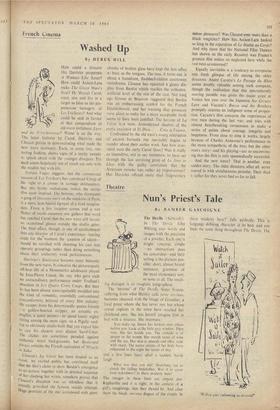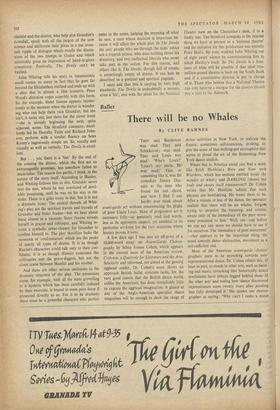Theatre
Nun's Priest's Tale
It y 11.% N1 E R C ASCOIC N E
The Devils. (Aldwych.) IN The Devils John Whiting uses words and iniages with the precision of a jeweller. Each one is bright. concrete, simple
The 'heroine' of The Devils, Sister Jeanne. suffering from what Huxley calls furor uterinus. becomes obsessed with the image of Grandier, a local priest whom she has never met but whose sexual exploits in the town have reached her cloistered cars. She lets herself imagine him in bed with a mistress. She murmurs:
You wake up. Dawn has broken over others before you. Look at the little grey window. Then turn. She lies beside you. The attitude is of prayer or the womb. Her mouth tastes of wine and the sca..Her.skin is smooth and silky. rank with sweat. The native odours of her body has,: exhausted in the night the scents of day.
and a few lines later, after a sudden, harsh laugh: • What was that you did? Stretching out to clutch the falling bedclothes. Was it to cover your nakedness? Is there modesty here?
The images in these lines are almost Pre- Raphaelite and it is right, in the coritext of a girl's imaginings, that they should be. And after them the bleak, envious disgust of the simple 'Is there modesty here?' falls perfectly.. This is language defining character at its best, and one finds the same thing throughout The Devils. The 'Willya quit following as around?'
chemist and the doctor, who help plot Grandier's downfall, speak with all the jargon of the new science and deliberate their plans in a pat cross- talk ripple of dialogue which recalls the discus- sions of the two tramps in Godot and which admirably gives an impression of hand-in-glove conspiracy. Poetically, The Devils can't be faulted.
John Whiting tells his story in innumerable small scenes, so many in fact that he goes far beyond the Elizabethan method and ends up with a play that is almost a film scenario. Peter Wood's direction copes superbly with this form. So, for example, Sister Jeanne appears myster- iously at the moment when the doctor is wonder- ing who can help them ruin Grandier; but she isn't, it turns out, just there for the clever irony —she is already beginning the next, quite separate, scene. The Stratford company, excel- lently led by Dorothy Tutin and Richard John- son, perform with a similar fluency on Sean Kenny's ingeniously simple set. So, vocally and visually as well as verbally, The Devils is excel- lent.
But . . . yes, there is a 'but.' By the end of the evening the drama, which the first act so extravagantly promises, has somehow failed to materialise. The reason lies partly, I think, in the nature of the story itself. According to Huxley, and Whiting follows him in this. Grandier never met the nun, whom he was convicted of devil- ishly possessing, until he was on his way to the stake. There is a grim irony in this, but it is not a dramatic irony. The central threads of Whit- ing's play are the spiritual travels and travails of Grandier and Sister Jeanne—but we hear about these almost in a vacuum. Sister Jeanne reveals herself in prayer and soliloquy, and Whiting in- vents a symbolic sewer-cleaner for Grandier to confess himself to. The play therefore lacks the moments of 'confrontation' which are the peaks of nearly all types of drama. It is as though Racine's characters could talk only to their con- fidants; it is as though Hamlet contained the soliloquies and the grave-diggers, but not the closet scene between Hamlet and his mother.
And there are other serious omissions in the dramatic structure of the play. The possession scene, for example, with all the nuns grovelling in a hysteria which has been carefully induced by their exorcists, is bound to seem pure farce if presented directly to us. For it to be dramatic there must be a powerful character who partici- pates in the scene, judging the meaning of what he sees, a man whose decision is important be- cause it will affect the whole plot. In The Devils the only people who see through the nuns' antics are a foppish prince, who does nothing about his discovery, and two ineffectual liberals who never take part in the action. For this reason, and others like it, The Devils, though full of events, is surprisingly empty of drama. It can best be described as a poetical and spiritual pageant.
I must add that this is carping by very high standards. The Devils is undoubtedly a success, even a 'hit'; and with the plans for the National Theatre now on the Chancellor's desk, it is a timely one. The Stratford company is the nearest thing we have at present to a 'national theatre' and the initiative for this production was entirely Peter Hall's, He even winkled John Whiting out of eight years' silence by commissioning him to adapt Huxley's book. So The Devils is a fore- taste of what will be possible if that ideal two- million-pound theatre is built on the South Bank and if a constructive director is put in charge of it. Those who believe that a National Theatre can only become a morgue for the classics should pay a visit to the Aldwych.







































 Previous page
Previous page